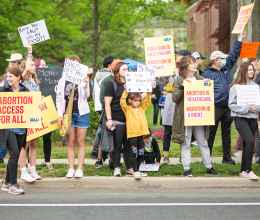Lawmakers have scheduled a reconvening this week to focus on pending issues, with a focus on jumpstarting efforts to fill judicial vacancies. However, it’s essential that they take up an issue of that demands immediate action: expanding access to abortion in the aftermath of Dobbs v. Jackson Women’s Health Organization, the U.S. Supreme Court decision that in June eviscerated the long-held constitutional right to abortion care in states throughout the country.
By law, New Jersey protects reproductive autonomy, including the right to an abortion, but it does not establish necessary protections to guarantee that people in our state have equitable access to that right. As lawmakers convene, they must take up the urgent unfinished business of expanding access to abortion regardless of insurance, immigration status, or income.
Many New Jersey communities face barriers in accessing health care that are the result of systemic racism. Long before the rollback of Roe, affordability and other obstacles have made lack of access a perennial barrier to receiving time-sensitive abortion care.
At Cherry Hill Women’s Center, in the years before the Dobbs decision gutted Roe v. Wade, we regularly cared for people impacted by state-level abortion restrictions. We watched as anti-abortion politicians across the country chipped away at access until the foundation of our reproductive rights crumbled beneath us. Post-Dobbs, the floodgates opened.
Now, we typically field hundreds of phone calls each day at our advocacy center from pregnant people across the country who are confused and concerned with the current legal landscape. We assist our callers as they determine how, where, and when they will be able to get the services they need and connect them with resources, including organizations that provide financial and practical support to further assist them in their journeys, such as the New Jersey Abortion Access Fund. Although we can currently offer immediate appointments, more states are moving to ban abortions. Wait times are increasing at clinics in the surrounding states, and meanwhile, our call volume increases.
New Jersey lawmakers can bolster access in our state amid this national crisis, but it requires immediate action and bold leadership. A bill currently before the Legislature, S2918/A4350, would expand access to abortion for New Jerseyans regardless of their insurance, immigration status or income.
This bill requires all private insurance plans used in New Jersey to cover abortion care with no out-of-pocket costs to the patient, and it establishes financial support for New Jerseyans who need abortion care but are uninsured or underinsured. Several other states — California, Illinois, Maine, Maryland, New York, Oregon, and Washington — already require private insurance to cover abortion care, and most require that patients pay no out-of-pocket costs or copays.
A reproductive health access fund created by S2918/A4350 would support clinical training programs, expand the number of providers, and offer security and operations grants to reproductive health care facilities. The bill codifies regulations authorizing health care professionals to provide abortion care and enacts protections for patients and providers alike.
With expanded access for New Jerseyans, Cherry Hill Women’s Center and other providers could open our doors wider to serve more people, with facilities having the stability of regular insurance reimbursements. The brunt of inaccessibility disproportionately falls on people of color, immigrants, LGBTQ+ communities, youth, low-income people, and residents of rural areas. New Jersey can and must be a leader in addressing these systemic health care barriers.
Every day that lawmakers fail to increase access, they unnecessarily put patients and providers under greater duress. We’re fortunate at our clinic to have some flexibility in offering a sliding scale, helping people avoid choices like whether to pay for essential health care or their rent. However, our resources are not limitless. If New Jerseyans had more access and affordability, we could accommodate more patients. Clinics could free up more funding to help people who do not have a supportive state government, and we could use emergency funds for those in greatest need.
This moment calls on all of us to do our part. Abortion providers, organizers, advocates, and allies have been preparing for this moment for years, building systems of support and community, taking action in the courts and in the streets, and making our voices heard. It’s time for our elected officials to do their part and meet this moment with true leadership. It’s time to finally pass necessary legislation expanding abortion access for all. Anything less is unacceptable.
This piece was originally published by The Star-Ledger/NJ.com







